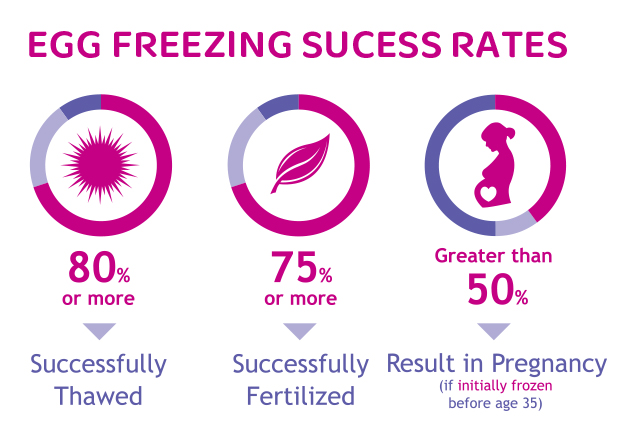Frequently Asked Questions About Egg Freezing
What is Egg Freezing?
Egg freezing (human oocyte cryopreservation) is an innovative technology in which a woman’s eggs (oocytes) are extracted, frozen and stored for future use. Egg freezing allows a woman to take control of her ticking biological clock and bank her eggs for future use. If infertility is experienced when she is ready to become pregnant, the eggs can be thawed and fertilized, with the resulting embryos then transferred into the uterus.
Although not a guarantee, egg freezing is analogous to an insurance policy for a woman’s future fertility.
Egg freezing allows a woman
to take control of her ticking
biological clock and bank
her eggs for future use.
Why does age matter?
When it comes to issues of fertility, it is a fact that the age of the egg, not the age of the woman matters most. Women are born with approximately 2 million eggs but over time the quantity and quality of healthy eggs decline. This directly impacts the monthly chance of conception. The percent of married women not using contraceptives that remain childless without treatment increases with age. The 9% incidence seen in women ages 25-29 increases to 30% by age 35. In women 40 to 44 years of age, 64% will remain childless.
Additionally, as eggs increase in age so do the risks of chromosomal abnormalities. It is estimated that 60% or more of normal appearing embryos at age 37 are genetically abnormal. As an example, the risk of a live birth with Down’s Syndrome increases from 1 in every 1,000 live births at age 30, to 1 in 30 at age 45.
What is known about egg freezing?
Research has found that when women use eggs donated by younger women, they can achieve the same pregnancy success rates as women in their 20’s.
Egg freezing provides an opportunity for women to be their own donors. Women can have their eggs retrieved at a younger age, and preserve them using oocyte cryopreservation technology. Therefore, when a woman is ready to get pregnant, she has her own younger eggs available which increase her chances of a successful pregnancy.
What is the current status of egg freezing?
After years of research, egg freezing has finally become a tangible reality.
In 2012 the American Society for Reproductive Medicine recognized the improved success rates and safety of this fertility preservation technology by removing the experimental label. This occurred after reviewing many scientific and clinical studies which demonstrated that younger women who underwent in-vitro fertilization using frozen eggs had a similar chance of successful pregnancy as those using fresh eggs. The research to date also suggests that babies born from frozen eggs are no different than those born as a result of IVF with fresh eggs.
Who Should Freeze Their Eggs?
Women who anticipate having children after the age of 35 and want the opportunity to preserve their future fertility may want to freeze their eggs.
There are other reasons to freeze eggs, which include delayed childbearing secondary to career momentum, and fertility preservation prior to undergoing medical procedures which may compromise future fertility (i.e. cancer treatment).
Additional Information
When it comes to making decisions about personal health, we believe knowledge is power. The Fertility Center of Miami encourages you to ask questions and learn more about your own fertility options.
As you explore these options, please be aware that you are not alone. Countless women before you have struggled with similar issues. Please, visit our website and read what other women have said about their personal fertility journeys and how they made the decision to take control. Now is the time to set your own biological clock.

